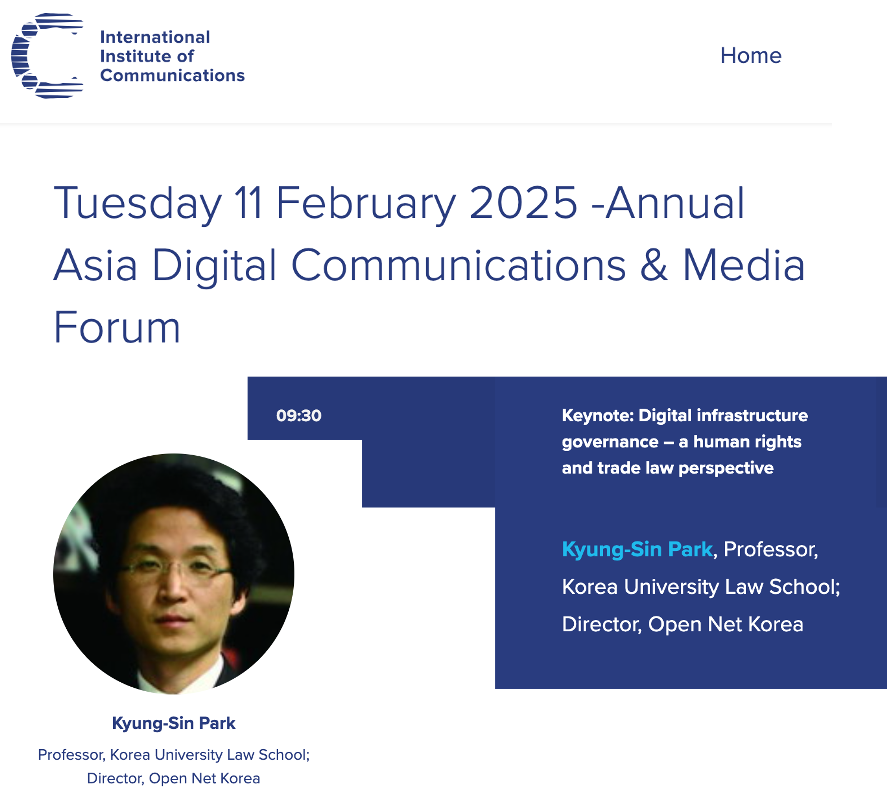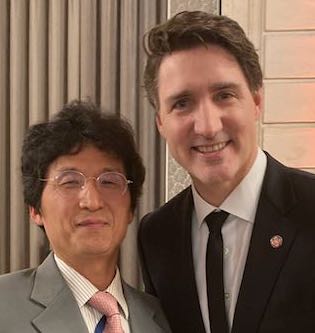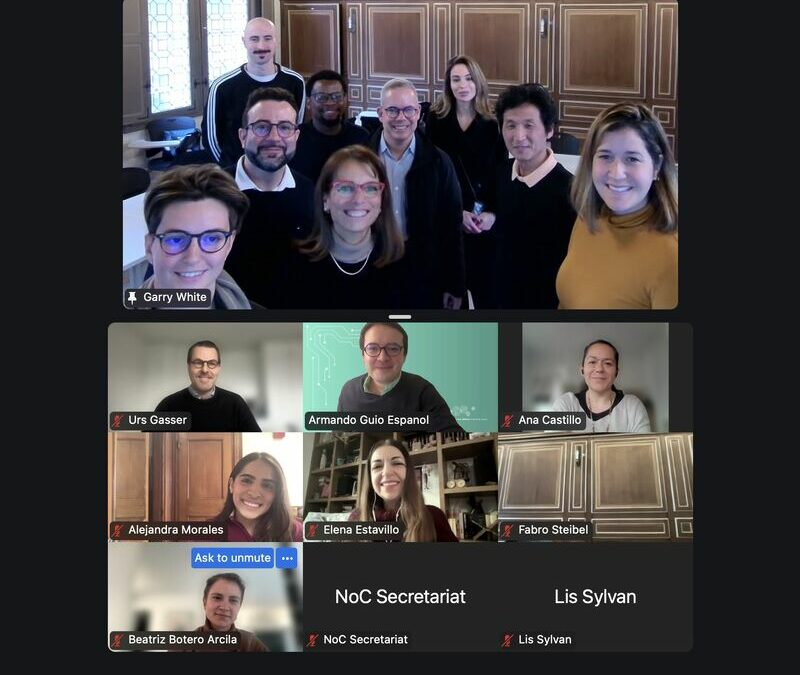On February 12, the second day of International Institute of Communications’ Annual Asia Digital Communications & Media Forum, K.S. Park gave a keynote speech examining the “network usage fee” debate from international trade law and international human rights law perspectives:

- The following speech script can be viewed together with the slides below.
UN human rights agencies are focusing on digital infrastructre as an enabler of human rights. They mean internet access. Why is internet considered a human right?
Ukraine refugees coming to refugee centers, what did they first look for? Blanket? Water? No, Wifi.
Information is powerful. It allows us to find blanket, water, and all other necessities.
Internet is not just information. Pre-internet, we had to pay $20 for each international phone call voice only. Post-internet, 200 ppl can be on video calls for hours and hours practically free of charge to anyone including ISPs in the middle. Pre-internet, these democracy fighters hand-printing protest flyers had to risk their lives in passing them out behind the eagle eyes of the police who would try to arrest and torture them. To reach 1 million ppl by phone or postage, they needed 1 million dollars. Post-internet, protests are organized in the comfort of home, by posting just one video anonymously with zero cost to the author for delivering that video to millions or even billions of people who watch it.
Did this come at the expense of someone else? No, the costs are the same.
Over 4 years of pandemic, while traffic volume increased 5 times, the total of both opex and capex of network management remained the same. Profits of large ISPs have only increased post-Internet. It is because as long as ISPs deliver the bandwidth promised to each house, there cannot be congestion.
Creating something big out of nothing. How was this magic made possible?
Because of two things: promise and science. Promise that all routers will deliver data packets to their immediate neighbors without charge without any condition — without discrimination financial or physical. Science that data consisting of electromagnetic waves cause no burden on the medium just as light reflected off mirrors cause no burden on the air or empty space or the mirror. This is the same as you watching TV at home hours and hours not paying a dime more. This is the same as me seeing you and my eyes collecting UHD-level high resolution video of all of you at no cost to anyone.
Assume there are only 3 computers in the whole world’s internet at connection capacity of 10 mbps, 50 mbps, and 100 mpbs. No matter how much you try to be the “heavy user”, you ability to cause congestion is limited by the size of the pipe you are using. You are already paying for that pipe. As long as everyone pay for his or her own pipe and the promise is kept, there is no reason for extra payment like delivery fees, sender pay or receiver pay. If people want to use more traffic, they will pay more and buy bigger pipes. Who said internet is free? As long as everyone pays connection fee at the end, that money is sufficient to support all the traffic the world needs because that is how connection fee is calibrated. Internet is free in that sense. Everyone pays for connection at end so no one pays for delivery in the middle.
This reality is lived by ISPs themselves right now. Internet is a commodity good, meaning that it is the same wherever you buy it. Everyone who sells “internet” to any single user (ISP 1, 2, 3, 4 on the slide) must guarantee the best efforts connection to all other users of the internet, including those on the Skylab, the moon or the Mars in 2035, (now there is more) regardless of where that single customer is, again including the Skylab, the moon or the Mars. Now, no single ISP has such network so ISPs must work with one another to deliver that full-connectivity even to a single user. They connect with one another through transit and peering. Transit fee is the connection fee like the service that end users buy from ISPs where they use the money to maintain connection to other ISPs, who together will deliver the full connectivity. Peering is connection without guaranteeing connection with other ISPs, so just exchange of traffic between the peering partners.
Whether through transit or peering, what has been established is that ISPs do not discriminate either physically or financially data traffic, meaning that they do not discriminate by content, authorship, device, application, or payment. Remember the promise of net neutrality. Traffic delivery cannot be performed or prioritized in exchange for payment or under condition on content, authorship, device, application, or payment. All ISPs shares their immediate connections with all other ISPs charging only for connection not for delivery. If this does not happen, each ISP will have to constantly ask other ISPs for money and the transaction cost alone of that will break down the internet. (I understand that Some ISPs may exceptionally and locally practice sender pay rules in charging transit (but only to save money to lower tier ISPs who want to reduce the transit fees for low usage)
So human rights requires protecting not just any internet but the internet that guarantees all of this.
Not just human rights. Let’s look at trade law. Imagine how much trade can take place over this powerful medium. Because of that, trade law keeps internet in a very special place. You know that FTAs and preferential trade agreements and regional trade agreements have chapters on environment and labor, in order to protect values which if ignored will allow countries to compete unfairly ruining domestic markets. Guess what? GATS (1994) already began to have an Annex of Telecommunications which was later incorporated into FTAs and PTA, RTAs. On top of that, the 1998, Agreement of Basic Telecommunications Services required governments to sanction anti-competitive practies of incumbent ISPs under which Telmex the incumbent phone carrier was disciplined by WTO for charging too high delivery fees. Furthermore, KORUS FTA, USMCA, and DTAs also began to contain a provision that recognize the value or requirement of consumers being able to reach all contents online. We legal scholars think that this is recognition of net neutrality. The only effectivey way to allow all consumers to access all contents efficiently is to deliver the any-to-any connectivity is the internet as I described today. the internet with the promise,If ISPs start discriminating by payment (delivery fee, not connection fee), content, authorship, consumers cannot access those contents.
Now, what does this have anything to do with the current issue such as ‘network usage fee’ or ‘fair share deal’? It is a requirement that foreign CPs not paying to peer are now required to pay.
Net neutrality clearly bans such sender payment because it discriminates data traffic by whether sender has paid it. I already explained how asking for payment will break down the internet. Notice FCC Open Internet Order 2010 which is the bible of net neutrality, which again bans delivery fees to be charged by ISPs to content providers for delivering to
One CAVEAT: Don’t be misled by the phrase “CPs already paying internet access fees” because Google, Facebook, they are paying by subseacables. Netflix is paying by distributing servers around the world. Korean ISPs are say, “we are not getting that money”. They are getting money. As all that traffic comes throug, they don’t need to pay high transit fees to other ISPs.
But notice footnote 76. How about paid peering fees? Paid peering arrangement is not touched. No one said paid peering has existed directly violates net neutrality.
The problem with the current initiatives in Europe and Korea is that paid peering is mandated with the force of law. What will happen? The other side will abuse that freedom. Charge a lot of money. What will happen then, the platforms required to pay are not charities. They will have to charge indvidual content providers, artists, media, whoever becomes popular on their servers and generate outbound traffic and therefore cost on them. It will cause the same effect Let’s say you are required to pay tip at restaurant in the amount that both agree on. Will you want to eat at restrauants? That is what happened with Twitch even before the law passed. If customers don’t come, will that be good for waiters/waitresses?
Also there is a history of the partial sender pay rule that has increased the sender side internet access fees, in other words, the transit fees to 8 times Paris, 10 times Frankfurt. It is likely that the peering fees will become that high under the rent-seeking oligopolistic behavior of big 3 telcos.
Some ppl are saying that network usage fees are required to stop reverse discrimination. But there is no discrimination here. One is transit and the other is peering. Compare the coverage of connectivity! Transit is much bigger. The Content provider only gets access to only these computers in the circle. The other will be required to pay transit. So there is no discrimination.
Contrarily, there is a discrimination against foreign CPs. Requiring transit payment is not oppressive at all because you need to pay it like you need to pay for food. Requiring peering payment is oppressive because peering payment is up for negotiation. the parties are free to negotiate and often do not pay at all. The law is like requiring you to pay a tip at the restaurant that both sides agree on!!
That is why some believe that network usage fee law violates KORUS FTA.
ISPs talk about Two-sided market theory. The argument is that you can charge twice. But ISPs are already charging twice, benefitting from the network effect. ISPs are already being paid for the traffic sent when they are paid for the traffic received. What ISPs want above is the third payment. The Nobel laureate economist Jean Tirole is the father of two-sided market theory. He jointly wrote a paper that paying for traffic will harm the market. This third payment will kill the market. Please look it up.
To wrap up, digital infrastrucre as a human right and as a mode of supply in international trade can be protected only together with its underlying arrangement of net neutrality as international human rights law and international trade law have already recognized. Paid peering may not be a direct violation of net neutrality but the government forcing only one party in the peering negotiation to pay will allow the other party ISPs to game the same system and will ultimately cause the same result as a net neutrality violation, where individuals and merchants will suffer great costs in delivering their messages to their partners in detriment to both democray and economic development.
Slides showing ISPs’ oligopolistic practices and the impact of the current sender pay rule since 2016.
2025-IIC-presentation

0 Comments